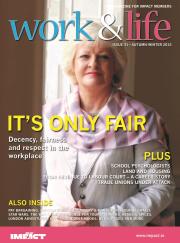Work & Life – latest issue out now
by Martina O'Leary
 |
| Work & Life's Autumn-Winter edition is available in your workplace now. |
|
The latest edition of Work & Life magazine is now available to mail subscribers and in your workplace.
The Autumn/Winter edition includes an exclusive interview with Congress general secretary Patricia King, who talks about the Congress Charter for Fair Conditions at Work, and also about her support for proposals by the National Economic and Social Council aimed at alleviating the housing crisis.
We also talk to former IMPACT national secretary Louise O'Donnell about her career, and the journey she's taken to a new position at the Labour Court.
The latest edition of Work & Life magazine is now available to mail subscribers and in your workplace.
The Autumn/Winter edition includes an exclusive interview with Congress general secretary Patricia King, who talks about the Congress Charter for Fair Conditions at Work.
Patricia also talks about the hope, and the challenge, for unions laid down by the new collective bargaining legislation, and also about her support for proposals by the National Economic and Social Council aimed at alleviating the housing crisis. Read the full interview HERE.
We also talk to former IMPACT national secretary Louise O'Donnell about her career, and the journey she's taken to a new position at the Labour Court.
The latest edition includes features on the National Education Psychological Service (NEPS), the vacant land levy, union busting in the UK, and pay bargaining in the state commercial and private sectors. Plus the usual mix of news, fashion, sport, music, books, food, gardens and competitions.
|
 |  |
Renua Ireland reaffirms its opposition to public sector pay restoration
Party proposes abolition of incremental pay for public sector workers
by Martina O'Leary
 |
| Wicklow TD and Renua deputy leader Billy Timmins |
|
The Renua Ireland political party has restated its opposition to public sector pay restoration.
During a studio debate on Newstalk FM on Tuesday (3rd November), the party’s deputy leader, Billy Timmins TD, said that the party opposed public sector pay restoration on the grounds that it damaged Ireland’s competitiveness.
Mr Timmins declined to say whether or not the party would stick to the terms of the Lansdowne Road Agreement if the party was in Government after the next general election.
The Renua Ireland political party has restated its opposition to public sector pay restoration.
During a studio debate with IMPACT communications officer Niall Shanahan on Newstalk FM’s The Right Hook on Tuesday (3rd November), the party’s deputy leader, Billy Timmins TD, said that the party opposed public sector pay restoration on the grounds that it “damaged Ireland’s competitiveness.”
Mr Timmins declined to say whether or not the party would stick to the terms of the Lansdowne Road Agreement if the party was in Government after the next general election.
The party launched one of two public sector policy documents this week, proposing the abolition of incremental pay for public sector workers and instead using the funds to create a ‘merit based’ pay system. The party leader, Lucinda Creighton TD, said that under-performing public servants should also face sanctions, up to and including dismissal.
In response Niall pointed out that, based on 2013 figures, the vast majority of public servants have reached the top of their incremental payscale, with almost two thirds of civil servants already on their salary maximum (2013 figures). He said that the vast majority of these (about 75%) are low and middle income workers, and that lower paid grades tend to have more points on their payscale.
Niall said that Renua were trying to resurrect the divisive and damaging public debate that emerged in the early years of the economic crisis, which attempted to divide public and private sector workers.
Lansdowne Road legislation debated
In a recent Dáil debate on the Government's legislation to give effect to the agreed pay restoration measures in the Lansdowne Road Agreement, Fianna Fáil said it would support the legislation. Sinn Féin deputy leader Mary Lou McDonald said that the party has insisted on pay moderation and a recognition that there is “still a small number of people in the system that were being overpaid.”
General election
IMPACT plans to issue a series of questions to all of the political parties and groups contesting the next general election, which is expected in the early months of 2016. The parties responses to the questions will be published on the IMPACT website and in the ebulletin as we draw closer to the election.
The questions will include whether parties are prepared to honour the terms of the Lansdowne Road Agreement, including pay restoration measures, protection against compulsory redundancies and the improved protections on outsourcing. Other questions deal with homelessness and the housing crisis, job creation, the Living Wage, the public ownership of Irish water and sanitation services, health, early childhood care and special education services.
 |  |
Expert report confirms urgent need to tackle low hour work abuse - Congress
Study identifies emergence of ‘if and when’ employment contracts.
by Niall Shanahan
 |
| The study has found the use of zero-hours contracts in Ireland is limited, but has identified the emergence of a type of employment called ‘if and when’ employment contracts. |
|
The Irish Congress of Trade Unions has said that the report of the expert group on low hours work “confirms what Congress and affiliated unions have been saying for some years on this issue.” The study, which was commissioned by the Government and produced by the University of Limerick (UL), looks at the prevalence of ‘zero hour’ contracts in Ireland.
The UL study has found the use of zero-hours contracts in Ireland is limited, but has identified the emergence of a type of employment called ‘if and when’ employment contracts.
Congress General Secretary Patricia King said: “We have consistently lobbied successive governments to have current legislation amended, in order to provide enhanced protection for workers on low-hour contracts, the majority of whom are low paid, female and whose voice is not often heard."
The Irish Congress of Trade Unions has said that the report of the expert group on low hours work “confirms what Congress and affiliated unions have been saying for some years on this issue.”
The study, which was commissioned by the Government and produced by the University of Limerick (UL), looks at the prevalence of ‘zero hour’ contracts in Ireland.
'If and when' working arrangements
The UL study has found the use of zero-hours contracts in Ireland is limited, but has identified the emergence of a type of employment called ‘if and when’ employment contracts.
Under existing legislation, workers must receive pay for at least 15 hours, or 25 per cent of the hours for which they have to make themselves available to an employer. The legislation was intended to create a floor in the labour market for workers who are contractually required to make themselves available, as they are with zero-hour contracts.
Workers with 'if-and-when' arrangements do not have a contractual requirement to make themselves available. In such cases, an employee works if available and an employer offers work if the company has it to offer. There is no legal obligation either to provide work or to perform work.
Protection
Congress General Secretary Patricia King said: “We have consistently lobbied successive governments to have current legislation amended, in order to provide enhanced protection for workers on low-hour contracts, the majority of whom are low paid, female and whose voice is not often heard. The recent strike and ongoing dispute involving Dunnes Stores workers graphically illustrated these issues and some of these workers suffered considerably for the brave stand they took.”
Patricia said that the newly-published report, whilst noting the lack of evidence on zero-hour contracts, “does point very effectively to the large scale and regressive employer behaviour in certain sectors, including retail/distribution, hospitality, and in some education and healthcare grades."
Recommendations
The study includes a range of recommendations aimed at retaining flexibility and improving the predictability of hours. These include employees receiving a contract of employment on the first day of a new job, giving 72 hours’ notice of requests for work or cancellation of work and ensuring a minimum of three hours continuous working.
Patricia said that the introduction of an ‘hours floor’, together with a deterrent in case of misuse of the 72 hours’ notice period are positive recommendations.
“Congress believes the recommendation to review the practice of ‘if and when’ should be prioritised. This is the worst form of casualisation and can lead to the gross exploitation of workers. We now urge the government to immediately make the necessary legislative arrangements to address the very serious issues raised in this report,” she said.
 |  |
‘Who Cares for the Carer?’ radio documentary
Documentary looks at the factors that cause burnout among social care workers in Ireland
by Niall Shanahan
 |
| The radio documentary was produced with support from the Mary Raftery Fund |
|
Radio producer Sorcha Heron looks at the factors that cause burnout among social care workers in Ireland in a new documentary ‘Who Cares for the Carer?’ which was broadcast on Newstalk FM at the end of October.
The documentary features contributions from IMPACT national secretary Andy Pike and a number of IMPACT members working in social care.
Radio producer Sorcha Heron looks at the factors that cause burnout among social care workers in Ireland in a new documentary ‘Who Cares for the Carer?’ which was broadcast on Newstalk FM at the end of October.
The documentary features contributions from IMPACT national secretary Andy Pike and a number of IMPACT members working in social care.
The radio documentary was produced with support from the Mary Raftery Fund, which aims to promote more in-depth investigative coverage of a range of social issues.
In her introduction to the documentary Ms. Heron explains that more than 6,000 social care workers tend to the needs of those most vulnerable in Irish society, but that they too are believed to be the most vulnerable of those working in the care sector.
"Often faced with challenging and violent behaviour - along with the suffering of the people they care for - social care workers are at increasing risk of being burnt out."
You can listen to the broadcast here.
|
 |  |
Progress reported on marriage registrars’ dispute
Terms of reference for independent review to be agreed
by Niall Shanahan
 |
IMPACT assistant general secretary Robbie Ryan has said that the dispute concerning new responsibilities for marriage registrars has made progress following a conciliation at the Workplace Relations Commission.
The dispute centres around new responsibilities contained in the Civil Registration (Amendement) Act 2014, specifically in relation to so-called ‘sham’ marriages, requiring HSE registrars to identify applications for ‘marriages of convenience’ and to refuse such applications when necessary.
The legislative amendments were introduced in August but without any prior consultation with registrars about the substantial new duties and responsibilities involved. IMPACT advised registrars not to undertake any new duties associated with the legislation.
Review
In a circular to members on 28th October, Robbie advised members that some progress had been made in a conciliation conference at the Workplace Relations Commission (WRC), with the parties scheduled to meet again on Thursday 12th November. The circular included clarification on procedures to be followed when registrars are dealing with clients affected by the revised legislation.
The WRC issued a letter to confirm that unions and management will agree the terms of reference for an early ‘time-bounded’ review of the service by an independent body, and that the HSE would provide the union with full details of the training of registrars for the extended role under the legislation.
AUDIO: RTE News At One, Tuesday 27th October – “Are marriage registrars refusing to marry people if one person is from the EU and the other is from outside the EU?” (Gavin Jennings interviews IMPACT communications officer Niall Shanahan).
 |  |
New report highlights trade agreement threat to public services
by Niall Shanahan
The European Federation of Public Service Unions (EPSU) has said that public services in the EU are under threat from transatlantic trade agreements that could endanger citizens’ rights to basic services like water, health, and energy for the sake of corporate profits.
EPSU says that the warnings emerge in a new report - Public Services Under Attack,TTIP, CETA, and the secretive collusion between business lobbyists and trade negotiators - published last month by an international group of NGOs and trade unions.
The study shows how the EU’s CETA deal with Canada, and the TTIP under negotiation with the United States, could lock public utilities into irreversible commercialisation and remove governments`ability to regulate services.
Read more HERE.
Download the full report HERE.
Dublin City Council passes motion to support Congress Charter
 |
Dublin City Council passed a motion earlier this week to support the Congress Charter for Fair Conditions at Work.
Councillor Alison Gilliland put the motion to the Council. “Dublin City Council is the largest council in the country and not only is it a significant employer but also awards a significant number of public contracts so the acceptance of the 5 principles of the Congress Charter will impact positively on a vast number of workers,” she said.
Councillor Gilliland added “Paying a living wage; providing fair working hours; the right to union representation and collective bargaining; respect, equality and ethics at work and fair public procurement are the five elements of the Charter.”
“Dublin City Council fully recognises trade unions - their employees are represented by IMPACT and SIPTU and their terms and conditions are determined in the main under collective bargaining agreements. However, when it comes to public procurement and the outsourcing of contracts there is no guarantee that, in practice, the terms and conditions of contracted workers comply with labour law or labour agreements particularly when it comes to subcontracted workers — fair public procurement procedures will ensure this.”
She added that the passing of the motion is "only a stepping stone" in ensuring the authority applies the principles of fair procurement. "We will need to ensure that appropriate resources are put in place to ensure the maximising the potential of fair procurement process in favour of workers and of local communities, particularly in the area of compliance with contract details.”
Dublin City Councillors were briefed on the Congress Charter by ICTU general secretary Patricia King ahead of the motion, which was passed unanimously by councillors. Congress is continuing to meet with local authorities througout the country to promote the Charter.
AUDIO: Congress Talks, the first in a new series of podcasts from the Irish Congress of Trade Unions featuring conversations, interviews and discussions on key issues for union members, activists and the wider public. The first episode looks at the Low Pay, Respect at Work and Childcare. It features Congress General Secretary Patricia King and senior official, Peter Rigney. Listen HERE.
 |  |
Nobel Peace Prize for Tunisian union
by Niall Shanahan
The Tunisian General Labor Union (Union Générale Tunisienne du Travail, UGTT) was named in October as one of the recipients of the Nobel Peace Prize, which was awarded to four organisations (the National Dialogue Quartet) for its role in the country's peaceful transition to democracy.
ETUC General Secretary Luca Visentini warmly welcomed the award. “The UGTT richly deserve the prize and the recognition it brings” he said.
"Trade unions have a vital role to play in promoting social dialogue not just in Tunisia, North Africa and the Arab states but throughout the world, including Europe. The joint commitment with employers was a condition of success.In light of the alarming terrorist attacks in Tunisia in recent months, it is more crucial than ever that unions should be fully involved in the democratic development of the country" he said.
Read more here.
|
 |  |
IMPACT members' draw - win a car

Cornmarket and General Motors Ireland have teamed up for an IMPACT members' draw which could see one lucky winner drive away with a 161 Opel Corsa Excite. Two runners up will win an iPad. To enter you must be an IMPACT member. Deadline for entry is April 30th 2016. To enter, simply click on the panel above (links to an external website).
|
|
|